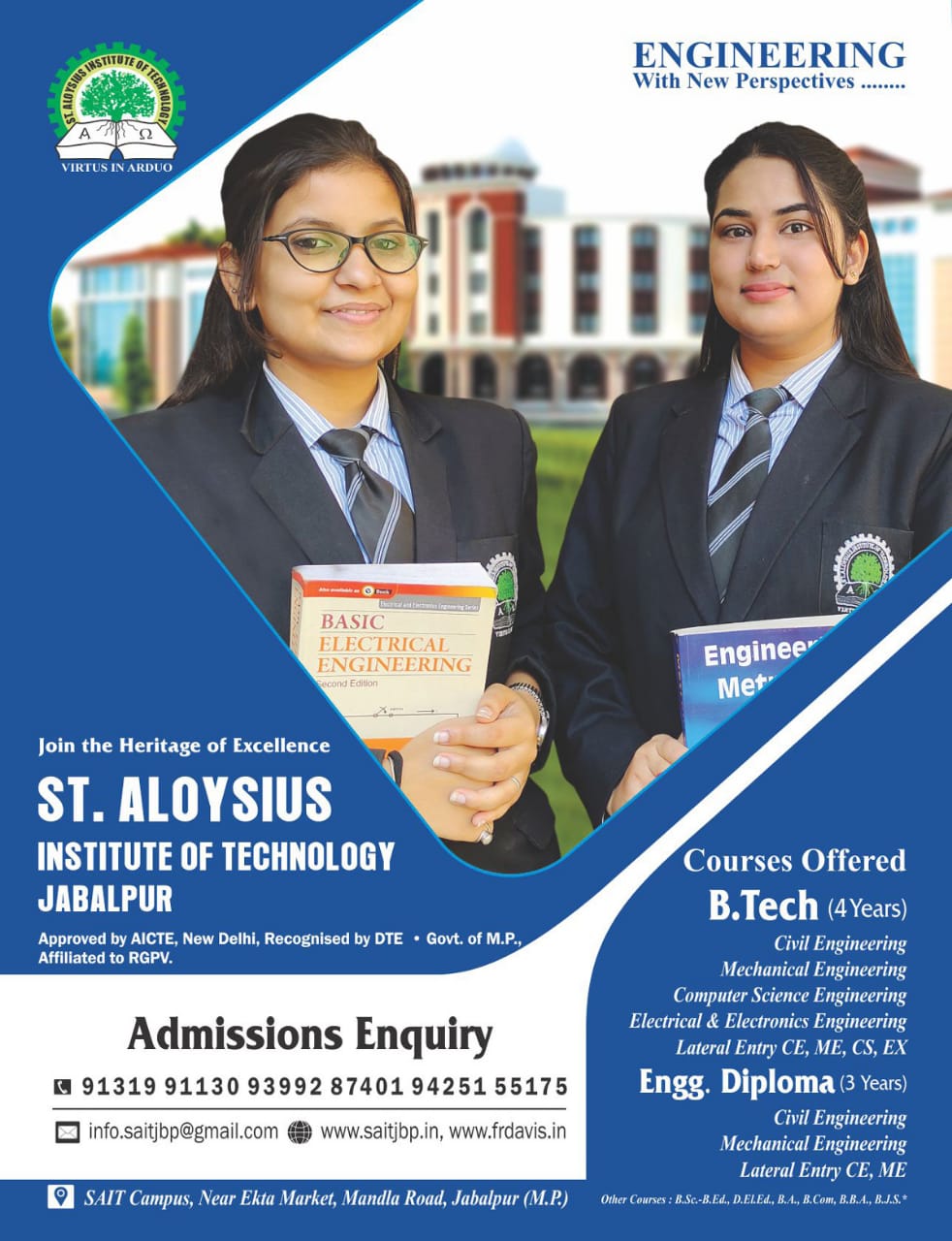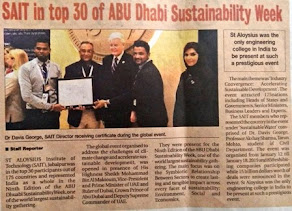(Interview with Dr. Fr Davis George – a titan in the education sector of India).
Dr. Fr Davis George, Principal of the famous St Aloysius College, Jabalpur had been to Kanpur to address a large group of School Principals of UP, Delhi- Rajasthan region gathered there . A dynamic scholar of national and international fame Dr. Fr Davis George has been networking with Metanexus Institute, Philadelphia, USA, WWME Asia, Xavier Board of Higher Education, AIACHE (All India Association of Christian Higher Education), UGC, The National Assessment and Accreditation Council (NAAC), Rotary International, Inter- Religious Forum, Dialogue between Science & Religion(AEWF), and so on.
He was kind enough to oblige a face to face for Indian Currents with Tisy Jose, UMI).
Right Leadership in Education: the Need of the Hour
Q 1. Management gurus apply their minds to the disciples of leadership with a human face for profit-motive in business. What according to you is the kind of Leadership needed in making the mission of education effective in India?
A 1. You have rightly used the word “Mission of Education”, and to make this “Mission” effective in India we need visionary and missionary leaders who are committed to make India a knowledge society. Illiteracy and poverty looms large in the horizon of India, which centuries ago was known for knowledge and wisdom. We need enlightened leaders who are committed to the cause of making India great, through quality and value based holistic education. Educational Institutions are not commercial entities with profit motive, for their survival. Education in the real sense should result in transformation of self and society, enhancing the quality of life at the individual and national level.
Q 2. Educational Institutions seem to make a mess by mixing up management and leadership roles and strategies. Where should a manager draw the line?
A 2. A Manager deals with maintaining the status quo, monitoring situation, allocating resources, communicating targets, measuring the results and feedback on the trends. Where as a Leader deals with strategic thinking, looks forward, creates visions, challenges, motivates, inspires and establishes benchmarks. In Indian Educational Institutions we need managers who are committed, knowledgeable, and socially responsible. Educational leaders often get tied down to infrastructural development and barely manage day to day activities; whereas an Educational leader should be a visionary who can do strategic planning and take his team to achieve the Institutional targets. Institutional effectiveness would be hampered if management roles and strategies are mixed up. Educational system can flourish only with a visionary leader who has the freedom to dream, impossible dreams and make it happen within the specific time. Hence, good management would always acknowledge, appreciate and give the required moral and physical support to the Principal so that he/she can take the Institution to greater heights.
Q 3. In the galaxy of Indian academicians, luminaries like Dr. S. Radhakrishnan, Dr. B. R. Ambedkar, Dr. Zakir Hussain, Hiren Mukherjee, Madhu Dandavate, Dr. Manmohan Singh et al were teachers who rose up as great leaders of the nation. What do you think are the reasons their tribe seems to have vanished from India today?
A 3. I don’t think “their tribes” have vanished from India today, though they may not be as prominent as they should be. There are known and unknown academicians in India who have made difference in the life of students and society. On the 5th of September, Teachers Day, we would see many such teachers who transformed the lives of students. It is true that we should have many brilliant academicians opting for political power and national leadership. The reason why we do not have that many academicians in politics and national leadership probably is that in today’s socio-political scenario an honest and committed teacher will not be able to compete with political maneuvering, money power and muscle power. Luminaries like Dr. A.P.J. Kalam and Dr. Manmohan Singh are not political leaders, though became great national leaders. Dr. Manmohan Singh is a member of the Rajya Sabha, yet not a Lok Sabha member which is indicative of the popular mind set towards those who are academically sound. In Indian politics today, we need to have intellectuals with impeccable track record, strength of character and professional accomplishments. We need to fight against corruption and petty-party politics and stop dividing the country in the name of caste, creed, religion and region. Outstanding academicians should be given a chance to enter into national main stream and leadership.
Q 4.Despite a plethora of ideas being churned out of Education Commission, Workshops and Seminars to correct the faulty system of education in India, the system seems stuck in the heavy-syllabus-bound-route learning: your comment.
A 4.Many Education Commissions, workshops and seminars have come and gone. They have also given valuable suggestions and significant insights to eradicate illiteracy, ensure compulsory and free primary education and introduce job oriented vocational and professional courses. The Knowledge Commission has challenged the present system of education and opened the frontiers of knowledge in the context of globalized society . The UGC and many State Governments have tried to update the syllabus and make it more job oriented. The teaching and learning process is no more centered exclusively on the teacher, but more on the process of learning through innovative ways like project work, web oriented classes, making use of ICT (Informational Communicative Technology), participatory learning, reforms in examination and assessments. There has been a noticeable paradigm shift in the purpose of education. We are now part of the world class knowledge society, with knowledgeable and self confident scholars and leaders emerging out of our institutions, making India proud and the vision 20-20 come true.
Q 5.While quality-education is a topic talked about increasingly in India, the quality of teachers and teacher-student relationship do not top the priority list… How do you think we can overcome the incompatibility?
A 5.In a globalized society, only quality will succeed. As educators we must review our system of education, and make strategic decisions to promote quality. TQM (Total Quality Management) should be our aim. We must never sacrifice quality for the sake of quantity. Quality is the buzz word. The quality of teachers and the quality of the Principal would be of prime importance. I would like to quote American Commission on Teacher Education, “The quality of the nation depends upon the quality of its citizens. The quality of its citizens depends - not exclusively but in critical measure - upon the quality of their education. The quality of their education depends, more than upon any other single factor, upon the quality of their teacher.”
Teacher-student relationship will play a vital role in the process of education- mentoring, coaching and counseling which would enhance the competencies and potentials of students and would help him/her to maximize his/her strengths and minimize his/her weaknesses. In our educational institutions we need to refocus our attention on “leadership through mentoring.”
Q 6. Since a decade or so there has been a calculated effort by some of the political parties to make education in India a pawn in their political class board in the form of doctored text books in social science. How do you think education can help purge politics rather than fall a prey to the political trap?
A 6. Corruption has become a way of life in India. Politics has deteriorated into power game. Religion and politics are being mixed up to divide the society and gain political power. Social Science text books have been tampered and changed; history has been rewritten to suite the ideology of political parties in power which is a very dangerous trend. Education has always played a significant role in the transformation and development of the national ethos. Educational institutions should not become the laboratories for experimenting party politics and pity ideologies. The focus of education should always be on development, empowerment, enlightenment, capacity building and transformation, providing the best to the least, effectively finding ways and means to include the excluded and bringing everyone to the main stream of the nation, making the secular and democratic fabric of India strong.
Q 7. The Catholic Church being the biggest NGO with its 14,539 Catholic Educational Institutions of which 448 are colleges, 534 Technical Institutions and 310 non-formal educational institutions is indeed a formidable force that ought to influence Indian education. But that’s not happening. Where do you think the lacunae lies?
A 7. Catholic Educational Institutions have done colossal work in the field of school education, higher education and now professional education. Many of the national leaders, scientists, doctors and professionals are the product of our institutions. Dr. A.P J. Kalam has very often mentioned that he has been much influenced and transformed during his student days in ST. Josephs College, Trichy, Tamil Nadu. Most of the people who studied in our institutions do acknowledge, appreciate and remain grateful for the quality education they have received. Despite the fact that our formal and non-formal educational institutions have contributed to the national growth we have certainly not become the formidable force that exerts influence on the national scene. This is mainly because we really do not get involved in the life of the nation; we are more concerned about “eternal life” that we forget about our life here on earth and our rights and duties as the citizens of this great country. Many of us are unaware of the preamble of our Constitution. Hence, our focus has only been on academic results and not in transforming the younger generation to become sensitive human beings and committed citizens with the strength of character and integrity in their professional and personal life. Another major reason is that we do not project a united front in any field of our activity. There should be more of uniform policy and purposeful approach in the field of education. Thirdly, somewhere down the line with in the church we have underplayed the great contribution made by educational institutions in spreading the kingdom values, in being the light, leaven and salt of the earth. Personality conflicts and ideological differences have affected the mission of Christ. We need to revisit and rediscover our mission in today’s world and reading the signs of times and stark realities of socio-cultural and political situations in India, take remedial measures and proactive steps to project a better image of the Church in India.
Q 8. As a scholar-priest-Principal of a prestigious college over 15 years and 10 years as Principal of a premier Senior Secondary School, in India, how do you assess your success in making education value-based in India?
A 8. Working in an educational institution like this has always been a humbling and learning experience. There has always been much to learn and much more to do. The Church related institutions should follow the path of Kingdom Values and must make a creative effort to disseminate Gospel values at all times. Gandhiji said, “My life is my message.” There was no dichotomy in his precept and practice. We have consistently tried to promote integrity in personal and professional life of the staff and the institution. Through daily common meditation, prayer, assembly and weekly value education/Bible class we have been trying to promote a college campus culture, centered on the life and teachings of Jesus our Teacher, and Saviour. We have very successfully promoted inter-religious dialogue and dialogue between science and religion; various clubs and societies, curricular and non-curricular activities have focused on value education and integral formation. Orientation programs for staff and students have been of great help in inspiring and motivating one and all in living their life based on genuine spirituality. Tremendous synergy is created through synthesis of IQ, EQ, and SQ.
Q 9. As one of the dynamic leaders in Catholic education in India, you have been working on war-footing in teaching the teachers the much needed ‘soft skills’. What suggestions have you for the Catholic educators to help bring out more enlightened human beings rather than learned monsters from our schools and colleges?
A 9. There was a time when the world focused only on IQ and people thought, the greater the IQ the better the professional and personal success in life. But today, research has shown that one needs more than ‘hard skills’- ‘soft skills’. Soft skill refers to the cluster of personality traits, social graces, facility with language, personal habits, friendliness, and optimism that mark each of us at varying degrees. As Catholic educators our focus should not be to produce selfish intellectual giants or learned monsters, but sensitive human beings who can reach out, touch and heal the broken world and work for a strong and developed nation founded on justice, truth, and brotherhood/sisterhood. Let us go beyond result-oriented education to transformation-oriented and value-based education. Then, truly, our institute will become the Light-House.
This entry was posted in Interviews
Subscribe to:
Post Comments (Atom)









0 comments:
Post a Comment